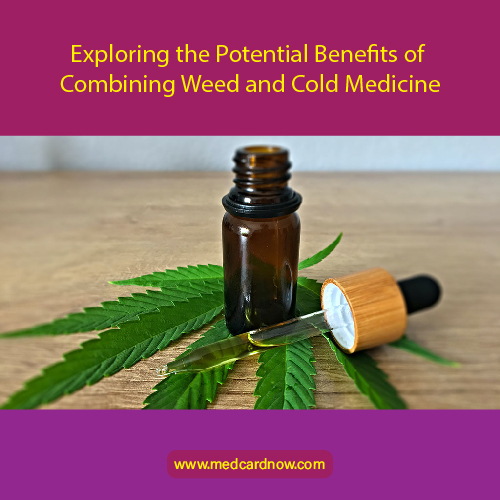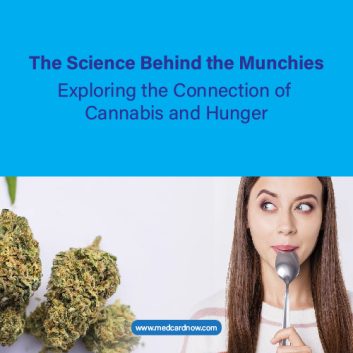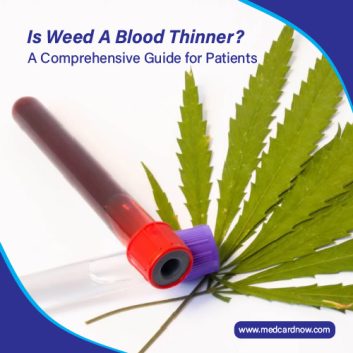
Ever wondered why taking cold medicine while also using marijuana is a no-no that’s been flooding our social media feeds? Well, the truth is while combining cannabis with over-the-counter (OTC) medications, there are certain dos and don’ts to keep in mind. Needed to know the benefits of combining weed and cold medicine.
So, make sure you’re up-to-date on what these ‘black holes’ of data mean for your health. This blog post sheds light on how weed interacts with common OTC drugs and within medical treatment plans. So, marketers, patients, doctors & nutritionists know if they should perhaps bask in ignorance or take notice.
Understanding the interaction between cannabis and OTC medications
The use of both cannabis and (OTC) medications can have a significant impact on our health and well-being. It is important to understand the connection between these two substances to ensure they are used safely and effectively. Cannabis has been more acceptable in recent years. It is now used for medicinal purposes in many countries around the world. This increased number has led to more people using cannabis in combination with OTC medications. This medicine can present some risks, if not monitored.
What is cannabis?
Cannabis contains some compounds that may contact the active ingredients found in certain OTC medications. This connection can reduce the effect of the medication, or even increase its strength beyond what was intended. For example, THC, one of the cannabinoids found in cannabis, is known to inhibit cytochrome P450 enzymes. These elements are involved in drug metabolism.
As a result, taking certain OTC drugs alongside cannabis products may cause them to stay in the system for longer than one expects. So, that can lead to an increased risk of side effects or overdose. Some common OTC medications such as ibuprofen or naproxen may increase levels of THC when taken together. Because they have the ability to inhibit liver enzymes responsible for metabolizing THC.
Due to these interactions between cannabis and OTC medications, it is important that anyone who combines them should speak with their healthcare provider first. A doctor will be able to provide advice based on two things. As:
- an individual’s medical history
2. current medical condition.
They will also be able to identify any risks with taking these substances together. They will also provide guidance on how best to manage any side effects. Take the time to understand that combining cannabis and OTC medications could potentially affect one’s health. It is essential for anyone considering using either substance side by side.
Common OTC Drugs: an overview of the most commonly used over-the-counter medications, their purpose, and potential interactions with cannabis
OTC drugs are medications that you can purchase without a prescription from your doctor. These medications cure common ailments like:
- headaches
- allergies
- and colds.
There is a wide variety of OTC drugs available on the market today, each one targeting specific symptoms or illnesses.
Most common OTC drugs:
Some of the most usable OTC drugs include pain relievers such as:
- Ibuprofen and acetaminophen
- decongestants such as pseudoephedrine and phenylephrine
- antihistamines such as loratadine and diphenhydramine,
- antacids like calcium carbonate and aluminum hydroxide
- laxatives including sennosides and docusate sodium
- cough suppressants containing dextromethorphan
- sleep aids like doxylamine succinate and diphenhydramine hydrochloride.
How do OTC drugs work?
It’s important to understand how OTC drugs work. So that, you can make the right decision about which drug is best for you. These are:
- Pain relievers work by blocking certain pathways in the body that cause pain signals in the brain
- decongestants reduce swelling in the nasal passages by constricting blood vessels
- antihistamines block histamine receptors to help alleviate allergy symptoms
- antacids reduce acidity levels in the stomach
- laxatives increase bowel movements
- cough suppressants act on nerve receptors in the brain to suppress coughing reflexes
- sleep aids induce drowsiness.
When using any kind of drug it’s important to be aware of the connection with other substances. Especially, when you may be taking it at the same time, including cannabis. Cannabis can interact with many types of drugs. So, it’s essential to talk to your healthcare provider before combining them.
The interactions between cannabis and OTC drugs vary greatly. But that could include:
- increased drowsiness or dizziness when combined with sleep aids or antihistamines;
- changes in digestion rate when taken with antacids or laxatives;
- reduced the effect of a pain reliever if taken with cannabis due to its analgesic properties;
- increased blood pressure when combined with decongestants or pseudoephedrine;
- difficulty breathing if taken with a cough suppressant containing dextromethorphan.
So, it’s always important to read all labels carefully before taking any kind of medication, even over-the-counter ones!
Medical Treatment Plans: discuss how cannabis can be used as part of medical treatment plans and what to consider when doing so
Cannabis is gaining popularity for its better treatment option in medical care. For many people, cannabis-based products can reduce pain. Besides, it can even treat certain symptoms and conditions more highly than pharmaceutical drugs. In fact, research indicates that cannabis may have some therapeutic benefits too to treat particular medical conditions.
When considering cannabis as part of a medical treatment plan, it’s important to understand the different forms of cannabis available. Such as;
- oil
- edibles
Weather, they differ in terms of dosage, absorption rate into the body, and potency.
It’s also important to consider the different types of cannabinoids found in each variety. As:
- THC (tetrahydrocannabinol)
- CBD (cannabidiol)
- CBG (cannabigerol)—and how these connect with each other to produce different effects.
Moreover, it’s important to remember that not all cannabis products are created equal. Some contain fillers that can be harmful if consumed.
When using cannabis for medical purposes it’s important to consult with your doctor about any risks and side effects before beginning a course of treatment. This is true for those who are pregnant or breastfeeding. Because the effects of cannabis on the fetus or infant are still unknown.
So, Marijuana use is still illegal in some states. So, those who live in such areas should be aware of their local laws before considering any medical marijuana therapy. Finally, there are many reported benefits of using cannabis. That’s why it’s important to remember that every person reacts differently to various substances and treatments; what works for one individual might not work for another.
Warning Signs and Best Practices: outline warning signs that could indicate a negative interaction between cannabis and OTC drugs, as well as best practices for using both safely
When it comes to cannabis and over-the-counter (OTC) drugs, there are warning signs that could indicate a negative connection between the two. It’s important to be aware of connections and take steps to ensure safe usage. Common warning signs include:
- feeling dizzy
- experiencing a drop in blood pressure
- or having difficulty breathing.
If you experience any of these symptoms after taking cannabis and OTC drugs together, seek medical help as soon as possible. If you’re taking any prescribed medications, speak with your doctor about the negative contact before combining them with cannabis.
Practices of using Cannabis and OTC drugs:
Other best practices for using both cannabis and OTC drugs safely include:
- only having products from reputable brands
- following the instructions on product packaging
- consulting with your doctor prior to use
- avoiding excess doses
- being mindful of drug interactions
- only consuming one type of medication at a time
- being aware of any sensitivities or allergies you may have
- and always storing medications in a secure location away from children.
However, if you’re pregnant or breastfeeding, consult with your doctor before taking any kind of medication.
So, when it comes to cannabis and OTC drugs, safety should always come first. Be sure to heed any warning signs that may indicate a negative connection between the two substances. Moreover, always speak with your healthcare provider before use. By following simple best practices, you can help ensure that you’re using both cannabis and OTC drugs safely and responsibly.
Conclusion: summarize key points and encourage readers to reach out for professional medical advice if they have any questions or concerns
Reach out for expert medical advice:
As a whole, if facing any concerning symptoms of mental health issues, it is important to reach out for expert medical advice. There are some self-help resources available online and through books. Moreover, a medical expert can provide you with a more comprehensive assessment. They even give you the chance to discuss your individual concerns in depth. Mental health professionals are trained to diagnose and treat mental health disorders. They may also provide resources for lifestyle changes that may help improve your overall mental well-being.
Seeking professional help:
When seeking professional help, it is essential to consider all options with weed and cold Medicine. Many people feel overwhelmed by visiting normal therapists’ offices. But there are many different types of care common today. You may find relief from talking to an online therapist via video chat or participating in group therapy sessions. It is also possible to receive therapy through support groups or apps on your phone or tablet. So, depending on your situation, medication may be given. So, consulting with a psychiatrist may be necessary.
Choose an experienced therapist:
No matter which route you choose, it is important to choose a qualified and experienced therapist with weed and cold Medicine. So that, they can handle the specifics of your case. Research the qualified therapists before entering into treatment. So that you can make sure, they have experience treating any issues you are trying to address. A good therapist should be able to provide a good treatment plan for you and your needs.
Remember that seeking help for mental illness isn’t a sign of weakness—it’s an indication of strength and courage! Taking the step to work with an expert can improve both the quality of life and emotional well-being in the long run. So, don’t hesitate if you think it is something you need.
Overall, it is important to be aware of the connections between cannabis and over-the-counter medications. But they can have negative effects if not used properly. Some common OTC drugs can come in contact with cannabis in bad ways. So, it is important to consult a medical expert before using both weed and cold Medicine. Cannabis can be used as part of a medical treatment plan. Patients should always consult their doctor before doing so. If you or someone is facing any of the warning signs from this blog post, please reach out for help. For more ideas on the topic, check out our website.



